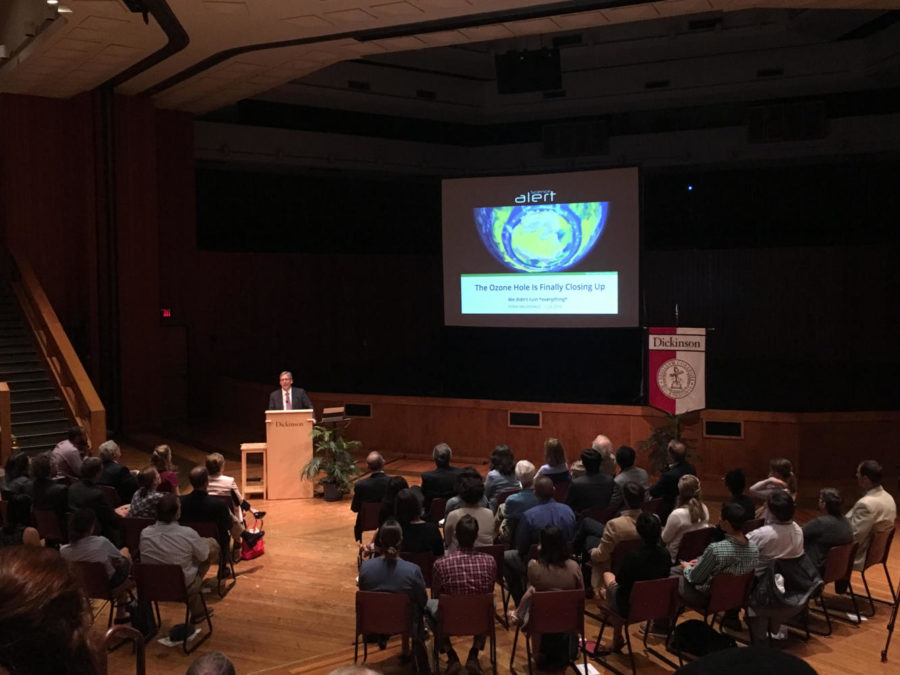Rose Walters Award Recipient Talks Climate Change, Human Behavior
Through the analysis of three principals of behavioral design, the 2017 Rose Walter Prize winner, and Rare CEO Brett Jenks, explained how he believes “that what is in between our two ears lies the solution to climate change problem.”
These three principals, emotional appeals, social incentives and choice architecture, in conjunction with their relationship to climate change adaptation, were shared to a large crowd in ATS on Oct. 10.
The principal of emotional appeals, as Jenks described, is the idea that “people want to help build their own solutions.” This means that when groups such as Rare bring plans of climate adaptation into vulnerable countries, they must work with the local peoples’ wants and needs.
This idea resonated with Dickinson College President Margee Ensign. In a statement after the talk, Ensign said, “people want to solve their own problems…when communities come together, he is absolutely right, if you are really focused on common goals there is nothing that you can’t do.”
Social incentives is the principal that explains how humans are social animals and want to feel like they belong and thus, will go along with the group. If people see others involved in change they will want to join.
Finally, choice architecture explains how humans have strange, sometimes irrational, ways of making decisions.
Other behavioral ideas were discussed to explain how humans are currently “hardwired to make climate change a really difficult challenge,” said Jenks, as humans are “really illogical in very predictable ways.” This includes human tendencies such as hyperbolic discounting, where humans heavily discount the future compared to the present. The residents of the United States also have a skewed risk perception, in relation to climate change. A national survey showed that over 60% of Americans believe that climate change will harm Americans but only around 30% believe that it will harm them.
Assistant Professor of Environmental Studies Michael Beevers talked about the uniqueness of Jenk’s approach of focusing on changing human behavior when addressing climate change. The way that “he was using psychology and social psychology and that kind of thing to try to get at some of these things was kind of insightful. You do not hear about many organizations doing that,” Beevers said.
When asked about his time at Dickinson, Jenks had nothing but positive things to say. “I cannot believe how interested the student body is in the environment and how committed facility are to making Dickinson a center of excellence for sustainability, it is really impressive”, he said.
Jenks was highlighted for this prize because of his work as CEO of the company Rare. This company, as described on the Dickinson College website, is “a global conservation organization that uses its expertise in human behavior change to create enduring and sustainable climate-smart solutions for both people and nature.”
Rare is the brainwork behind applying the three key principals aforementioned to climate change and adaptation. They are currently working with over 350 partners in 50 different countries to spread their ideas globally.
The Sam Rose ’58 and Julie Walters Prize was founded in 2012 and is awarded for “Global Environmental Activism.” After Jenk’s talk, Rose himself discussed what the motivation behind this award was. “I felt that the environment is a problem that my generation created, so I feel this is my chance to try to help and maybe put a dent in the problem, and I think it’s a problem of our age,” said Rose.
He also talked highly about the work of Jenks, “I think that Brett is [a] positive guy and he is working on pieces of it and it shows that if there are enough people like that working on the problem and not giving up that maybe we’ll get there.”
The recipient of this prize is also rewarded with $100,000. Jenks has already implemented actions to use this money in ways that will help fund Rare so it can spread increase the spread of their ideas.
Past winners of this prize include Bill McKibben, Mark Ruffalo and Elizabeth Kolbert
Jenks was also on campus for a breakfast hosted by the Center for Sustainable Education as well as a Student Leader Roundtable Lunch. Nam Nguyen ’19 attended breakfast, lunch, and the talk. Nguyen was interested in the point of view on human beings that Jenks provided. “Through this lens, he is able to understand our place within the large ecosystems and designs solutions that would benefit both,” said Nguyen.
On Thursday, Oct. 12, Jenks will continue to share his knowledge with the Dickinson community through a workshop.






